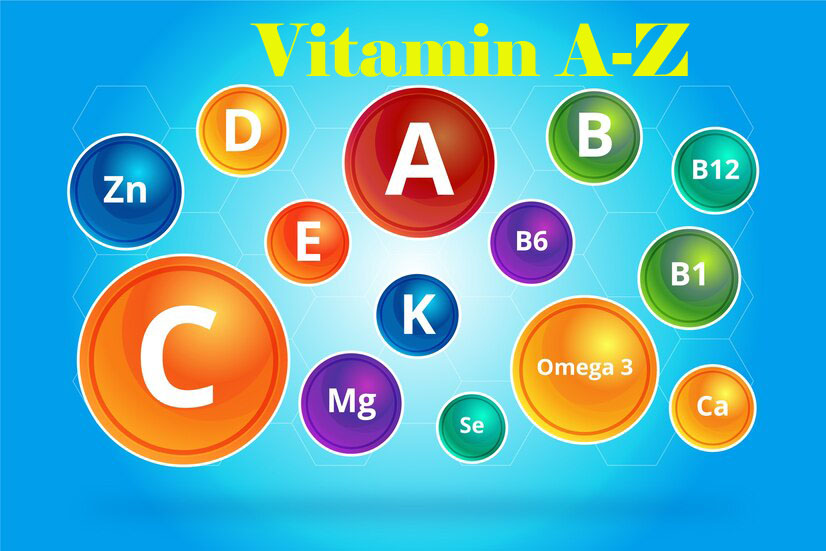Welcome to a comprehensive guide on the essential vitamin A-Z and minerals that should be part of your daily diet – from Vitamin A-Z (A to Zinc)! Whether you’re a health enthusiast looking to optimize your nutrition or simply curious about the benefits these nutrients offer, this blog will shed light on why they are crucial for your overall well-being. So, let’s embark on a journey through the alphabet of vitamin A-Z and minerals for a healthier you!
Vitamin A
In the list of Vitamin A-Z, Vitamin A is in top order. Vitamin A, also known as retinol, plays a vital role in maintaining healthy vision, immune function, and cell growth. It is commonly found in orange fruits and vegetables like carrots, sweet potatoes, and pumpkins. Additionally, leafy greens such as spinach and kale are excellent sources of this essential nutrient.
Consuming enough Vitamin A supports the health of your eyes by aiding in night vision and protecting the cornea. Moreover, it boosts your immune system’s ability to fight off infections by promoting the production of white blood cells.
Besides its benefits for vision and immunity, Vitamin A also contributes to skin health by helping with cell regeneration. This means that including foods rich in Vitamin A can support clear skin and a youthful complexion.
Incorporating Vitamin A into your diet through whole foods or supplements is crucial for overall health and well-being. So next time you’re at the grocery store or planning meals, remember to prioritize this powerhouse nutrient!. In the list of Vitamin A-Z, Vitamin B is in second number.
Vitamin B1 (Thiamin)
Are you familiar with the essential role that Vitamin B1, also known as Thiamin, plays in your overall health and well-being? This vital nutrient is crucial for converting carbohydrates into energy, supporting proper nerve function, and maintaining a healthy metabolism. Without an adequate intake of Vitamin B1, you may experience symptoms such as fatigue, irritability, and weakness.
Including foods rich in Vitamin B1 in your daily diet can help ensure that you meet your body’s requirements for this important nutrient. Some excellent sources of Thiamin include whole grains, legumes, nuts, pork, and fortified cereals. By incorporating these foods into your meals regularly, you can support optimal energy levels and promote the proper functioning of your nervous system. In the list of Vitamin A-Z, Vitamin B1 is in 3rd order.
Next time you’re planning your meals or snacks for the day be sure to consider how you can incorporate more Vitamin B1-rich foods into your diet to reap its numerous benefits!
Vitamin B2 (Riboflavin)
Are you looking to boost your energy levels and support healthy skin and eye function? Look no further than Vitamin B2, also known as Riboflavin. This essential nutrient plays a crucial role in converting food into energy for the body to use efficiently.
Riboflavin is water-soluble, meaning it needs to be replenished daily through your diet. Foods rich in Vitamin B2 include dairy products, lean meats, green leafy vegetables, and whole grains. Adding these foods to your meals can help ensure you’re meeting your daily riboflavin requirements.
In addition to its role in energy production, Riboflavin is also important for maintaining healthy skin and vision. It acts as an antioxidant, helping protect cells from damage caused by free radicals. In the list of Vitamin A-Z, Vitamin B2 is in 4th order.
If you often feel fatigued or notice changes in your skin or eyesight, consider adding more Riboflavin-rich foods to your diet. Your body will thank you for the extra boost of this vital vitamin!
Vitamin B3 (Niacin)
Are you looking to boost your energy levels and support proper digestion? Vitamin B3, also known as Niacin, might just be the nutrient you need in your daily diet.
Niacin plays a crucial role in converting food into energy, making it essential for overall vitality. It also helps maintain healthy skin, nerves, and digestive system function.
In addition to its energizing properties, Niacin is known to support heart health by helping to lower cholesterol levels and reduce cardiovascular risks. Incorporating foods rich in Vitamin B3 such as poultry, fish, nuts, and whole grains can help ensure you’re meeting your daily requirements.
So next time you’re planning your meals or reaching for a snack, remember the importance of including sources of Niacin for optimal health and well-being.
Vitamin B6
Vitamin B6, also known as pyridoxine, is a crucial nutrient that plays a vital role in various functions within the body. This water-soluble vitamin is essential for metabolizing proteins and carbohydrates, aiding in the formation of red blood cells, and supporting cognitive development.
Additionally, Vitamin B6 is involved in producing neurotransmitters like serotonin and norepinephrine, which regulate mood and help combat stress. It also contributes to maintaining healthy immune function by supporting the production of antibodies that fight off infections.
Incorporating Vitamin B6 into your daily diet can be done through consuming foods such as poultry, fish, bananas, chickpeas, and avocados. However, if you struggle to meet your recommended intake through diet alone, supplements are available to ensure you’re getting an adequate amount of this essential vitamin.
Ensuring you have sufficient levels of Vitamin B6 can help promote overall well-being and support optimal health throughout your body.
Vitamin B12
Vitamin B12, also known as cobalamin, plays a crucial role in maintaining the health of your nerve cells and DNA synthesis. It is essential for red blood cell formation and neurological function.
This water-soluble vitamin is primarily found in animal products like meat, fish, eggs, and dairy. For vegans or those with dietary restrictions, fortified cereals or supplements can be good sources of Vitamin B12.
Deficiency in Vitamin B12 can lead to symptoms such as fatigue, weakness, constipation, loss of appetite, weight loss, and even neurological changes like numbness and tingling in the hands and feet.
To ensure you meet your daily requirements of Vitamin B12, it’s important to include foods rich in this nutrient in your diet or consider supplementation if needed. Consulting with a healthcare provider can help determine the best approach for meeting your Vitamin B12 needs.
Vitamin C
Vitamin C is a powerhouse nutrient that plays a crucial role in supporting our immune system, skin health, and overall well-being. This essential vitamin is water-soluble, meaning the body doesn’t store it for long periods, so we need to regularly consume it through our diet or supplements.
One of the key benefits of Vitamin C is its antioxidant properties. It helps combat oxidative stress by neutralizing free radicals in the body, which can contribute to chronic diseases and aging. Additionally, Vitamin C supports collagen production, aiding in wound healing and maintaining healthy skin.
Research suggests that Vitamin C may also help reduce the duration and severity of colds by boosting the immune system’s response. From citrus fruits to bell peppers and leafy greens, there are plenty of delicious ways to incorporate this vital nutrient into your daily diet.
Ensuring an adequate intake of Vitamin C can have a positive impact on your overall health and vitality. So make sure you’re getting enough of this essential vitamin for optimal well-being!
Chromium
Chromium is a key mineral that plays a vital role in various bodily functions. It is known for its ability to enhance the action of insulin, helping to regulate blood sugar levels and improve metabolism. This essential nutrient can be found in foods like broccoli, whole grains, and nuts.
In addition to its impact on blood sugar control, chromium also supports healthy brain function by influencing neurotransmitter pathways. Studies suggest that it may help improve cognitive function and mood regulation.
Furthermore, chromium has been linked to cardiovascular health by promoting proper cholesterol levels and supporting overall heart function. By incorporating chromium-rich foods into your diet or considering supplementation under the guidance of a healthcare professional, you can support your body’s optimal functioning.
Vitamin D
Vitamin D, often referred to as the “sunshine vitamin,” plays a crucial role in various bodily functions. Our skin produces Vitamin D when exposed to sunlight, but it can also be obtained from certain foods and supplements.
This essential vitamin is known for its role in maintaining healthy bones and teeth by aiding in calcium absorption. It also supports immune function, muscle strength, and overall well-being.
Deficiency in Vitamin D can lead to health issues such as weakened bones (osteoporosis) and increased risk of infections. It’s important to ensure an adequate intake of this vital nutrient through sun exposure or dietary sources like fatty fish, fortified dairy products, and egg yolks.
Incorporating Vitamin D into your daily routine can have a positive impact on your health and vitality. So make sure you’re getting enough of this sunshine vitamin to support your body’s optimal functioning!
Vitamin E
Vitamin E is a vital nutrient that acts as a powerful antioxidant in the body. It helps protect cells from damage caused by free radicals, which are unstable molecules that can harm healthy cells. The main function of vitamin E is to support the immune system and promote healthy skin.
Including foods rich in vitamin E, such as almonds, sunflower seeds, spinach, and avocado, in your daily diet can help maintain overall health and well-being. Vitamin E also plays a role in supporting eye health and may reduce the risk of developing age-related macular degeneration.
In addition to its antioxidant properties, vitamin E has anti-inflammatory effects that can help reduce inflammation in the body. This makes it beneficial for individuals with conditions like arthritis or asthma. Ensuring an adequate intake of vitamin E through diet or supplements can contribute to optimal health and wellness.
Folic Acid
Folic Acid, also known as Vitamin B9, plays a crucial role in supporting cell division and growth. It is essential for the formation of DNA and RNA, making it vital for overall health and development.
A deficiency in Folic Acid can lead to anemia, fatigue, and even potential birth defects during pregnancy. That’s why incorporating foods rich in this nutrient into your diet is important.
Leafy greens like spinach, broccoli, asparagus are excellent natural sources of Folic Acid. You can also find fortified cereals and grains that are enriched with this essential vitamin.
For pregnant women especially, ensuring an adequate intake of Folic Acid is crucial for the healthy development of the baby’s neural tube. This simple addition to your daily diet can have significant long-term benefits for both you and your little one.
Vitamin K
Vitamin K is a fat-soluble vitamin that plays a crucial role in blood clotting and bone health. It comes in two forms: K1 (phylloquinone) found in plants, and K2 (menaquinone) produced by bacteria in the gut.
In terms of blood clotting, Vitamin K activates proteins that help with coagulation, preventing excessive bleeding and promoting wound healing. On the other hand, it also supports bone health by aiding in the regulation of calcium to keep bones strong and healthy.
While deficiency is rare due to its presence in various foods like leafy greens, cabbage, broccoli, fish oil, and liver; those with malabsorption issues or taking certain medications may be at risk. Always consult with a healthcare provider before starting any new supplement regimen involving Vitamin K.
Iodine
Iodine is a vital mineral that plays a crucial role in maintaining optimal thyroid function. The thyroid gland uses iodine to produce hormones that regulate metabolism, growth, and energy production in the body.
A deficiency in iodine can lead to various health issues, such as hypothyroidism, goiter, and cognitive impairments. Therefore, it’s important to ensure an adequate intake of iodine through your diet or supplements.
Seafood like seaweed, fish, dairy products, and iodized salt are good dietary sources of iodine. However, if you have specific dietary restrictions or preferences that limit these food options, you may consider taking an iodine supplement after consulting with a healthcare provider.
Remember that balance is key when it comes to incorporating this essential mineral into your daily diet for overall well-being and optimal thyroid health.
Magnesium
Magnesium is a vital mineral that plays a crucial role in various bodily functions. It contributes to over 300 enzyme reactions, including energy production and muscle function. This essential nutrient also helps regulate blood sugar levels and support bone health.
In addition to its physiological benefits, magnesium has been linked to improved mood and reduced stress levels. Studies suggest that adequate magnesium intake may help alleviate symptoms of anxiety and depression.
Furthermore, magnesium plays a key role in supporting cardiovascular health by helping maintain normal heart rhythm and blood pressure levels. Incorporating magnesium-rich foods like nuts, seeds, whole grains, and leafy green vegetables into your diet can help ensure you meet your daily requirements for this important mineral.
Prioritizing magnesium intake is crucial for maintaining overall health and well-being.
Potassium
Potassium is an essential mineral that plays a crucial role in various bodily functions. From regulating fluid balance to supporting muscle contractions, potassium is a key player in maintaining overall health.
When it comes to our diet, potassium-rich foods like bananas, sweet potatoes, and spinach can help ensure we meet our daily requirements. Adequate potassium intake can also help lower blood pressure and reduce the risk of stroke.
In addition to its role in cardiovascular health, potassium also supports proper nerve function and helps keep our muscles working efficiently.
So next time you’re planning your meals, don’t forget to include potassium-rich foods to support your body’s optimal functioning. Your heart, muscles, and nerves will thank you!
Selenium
Selenium, a vital trace mineral, plays a crucial role in the body’s antioxidant defense system. It helps protect cells from damage caused by free radicals and oxidative stress. This essential nutrient is involved in thyroid function, immune health, and even fertility.
Incorporating selenium-rich foods like Brazil nuts, seafood, sunflower seeds, and eggs into your daily diet can help ensure you meet your daily requirements. However, it’s important not to exceed recommended levels as too much selenium can be harmful.
Research suggests that selenium may also have anti-inflammatory properties and could potentially reduce the risk of certain chronic diseases. While more studies are needed to fully understand its impact on overall health, adding selenium to your diet through natural sources is a simple way to support your well-being.
Conclusion
Incorporating a variety of essential vitamin A-Z and minerals into your daily diet can have numerous benefits for your overall health and well-being. From Vitamin A-Z (A to Zinc), each nutrient plays a vital role in supporting various bodily functions and processes. By ensuring you consume a diverse range of foods rich in these nutrients, you can help maintain optimal health and potentially reduce the risk of certain diseases.
Remember, it’s always best to consult with a healthcare professional or nutritionist before making significant changes to your diet or supplement routine. They can provide personalized recommendations based on your individual needs and health goals. So, start exploring the benefits of Vitamin A-Z today by incorporating a colorful array of fruits, vegetables, lean proteins, whole grains, and dairy products into your meals. Your body will thank you for it!












1 thought on “The Benefits of Vitamin A-Z in Your Daily Diet”